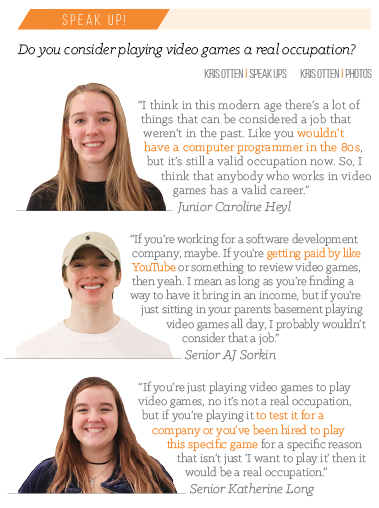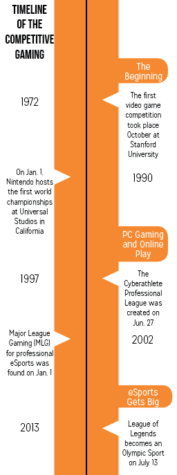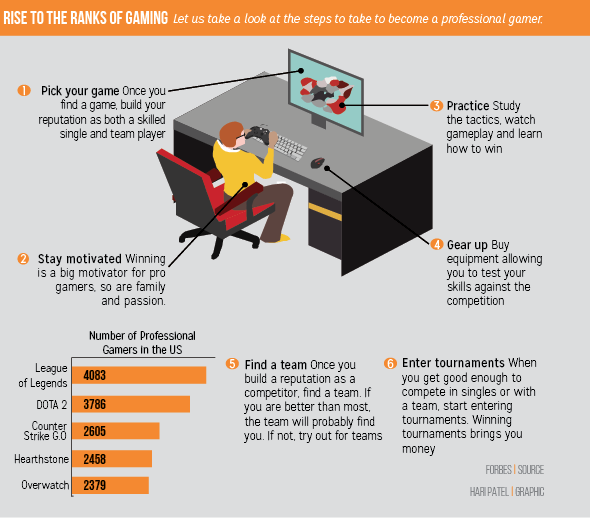Three days before Christmas, sophomore Zach Howard and his friends walked into his basement to find three TVs with GameCubes wired to play “Super Smash Bros. Melee.” To get ready, they had warmed up techniques such as the wave dash and multish ine. Their end goal: winning a local $1,000 prize tournament. Only a few days later, sophomore Nolan Lederman hosted his yearly Christmas stream on Twitch playing video games such as “FIFA” and “Call of Duty.” His goal was to raise money for local charities.
ine. Their end goal: winning a local $1,000 prize tournament. Only a few days later, sophomore Nolan Lederman hosted his yearly Christmas stream on Twitch playing video games such as “FIFA” and “Call of Duty.” His goal was to raise money for local charities.
Competitive gaming and streaming have gained traction for the past several years. Locally, that support has even reached IUPUI, which will host a “League of Legends” (LoL) High School Invitational starting on Feb. 4 with a $10,000 in scholarships and money at stake. Even though eSports is becoming increasingly popular amongst competitive gamers, some say encouraging gaming as a career is not viable for most people.
For instance, Howard said it is possible to make some money from gaming, but it is extremely hard to make a living.
Howard said, “The amount of time and effort that the pros put into the game is unimaginable. For a game like Melee, even the most basic techniques can take months to master, especially since they are things that require almost perfect execution. Even after someone were to master the basics, many of the games that people play competitively have such high skill ceilings that there is almost always something new to learn to try to beat the competition.”
Howard also said having others to practice with remains a problem.
“When you reach a certain point in a game, the computer doesn’t cut it for practice,” Howard said. “The computer can’t do what a person can do, and for games like Dota 2 or ‘League of Legends,’ you need a small group who is willing to practice with you constantly.”
Andrew Gostomelsky, follower of both eSports and streaming and junior, said he agrees with Howard.
“Playing a game is like playing a sport,” Gostomelsky said. “You don’t see a high school quarterback become a NFL player in a day. Both require an insane amount of time to practice most everything the game has to offer, from throwing form in football to frame perfect inputs in a game.”
Similarly for streaming, Lederman said the work necessary to put in is significant. He said there are many more factors than just skill in a video game.
“Streaming is completely different from tournament play in my opinion. When you stream, you aren’t trying to beat an opponent. You’re trying to entertain someone,” Lederman said. “If you aren’t funny, witty or just someone that is fun to watch, no one is going to watch you play games, much less donate money.”
Lederman also said streaming requires a higher luck factor.
“It is even worse with streaming because there is a lot more luck involved. You depend on viewers to produce ad revenue or donations, so if you don’t have many people watching your stream, it doesn’t matter how much you work towards it,” Lederman said. “On my last Christmas stream, we only got around 20 viewers even after we circulated our Twitch link.”
Gostomelsky said he agrees with Lederman and there’s lots of work to be done while streaming.
“There are so many things that go into being a regular streamer that for everyone I know, it simply takes too much time,” Gostomelsky said. “Not only do you have to manage donations set up chat moderators (and) plan your content, you also have to connect with a viewer. As far as my experience watching streamers goes, some people naturally have it and others work really hard to get it. Either way, it’s a long term commitment when you choose to stream.”
Howard said, “Gaming is a great way to kill time with friends, but when it comes to being a career choice, it’s one of those ones where you want to have a backup plan.”

































![What happened to theater etiquette? [opinion]](https://hilite.org/wp-content/uploads/2025/04/Entertainment-Perspective-Cover-1200x471.jpg)













































![Review: “The Immortal Soul Salvage Yard:” A criminally underrated poetry collection [MUSE]](https://hilite.org/wp-content/uploads/2025/03/71cju6TvqmL._AC_UF10001000_QL80_.jpg)
![Review: "Dog Man" is Unapologetically Chaotic [MUSE]](https://hilite.org/wp-content/uploads/2025/03/dogman-1200x700.jpg)
![Review: "Ne Zha 2": The WeChat family reunion I didn’t know I needed [MUSE]](https://hilite.org/wp-content/uploads/2025/03/unnamed-4.png)
![Review in Print: Maripaz Villar brings a delightfully unique style to the world of WEBTOON [MUSE]](https://hilite.org/wp-content/uploads/2023/12/maripazcover-1200x960.jpg)
![Review: “The Sword of Kaigen” is a masterpiece [MUSE]](https://hilite.org/wp-content/uploads/2023/11/Screenshot-2023-11-26-201051.png)
![Review: Gateron Oil Kings, great linear switches, okay price [MUSE]](https://hilite.org/wp-content/uploads/2023/11/Screenshot-2023-11-26-200553.png)
![Review: “A Haunting in Venice” is a significant improvement from other Agatha Christie adaptations [MUSE]](https://hilite.org/wp-content/uploads/2023/11/e7ee2938a6d422669771bce6d8088521.jpg)
![Review: A Thanksgiving story from elementary school, still just as interesting [MUSE]](https://hilite.org/wp-content/uploads/2023/11/Screenshot-2023-11-26-195514-987x1200.png)
![Review: "When I Fly Towards You", cute, uplifting youth drama [MUSE]](https://hilite.org/wp-content/uploads/2023/09/When-I-Fly-Towards-You-Chinese-drama.png)
![Postcards from Muse: Hawaii Travel Diary [MUSE]](https://hilite.org/wp-content/uploads/2023/09/My-project-1-1200x1200.jpg)
![Review: "Ladybug & Cat Noir: The Movie," departure from original show [MUSE]](https://hilite.org/wp-content/uploads/2023/09/Ladybug__Cat_Noir_-_The_Movie_poster.jpg)
![Review in Print: "Hidden Love" is the cute, uplifting drama everyone needs [MUSE]](https://hilite.org/wp-content/uploads/2023/09/hiddenlovecover-e1693597208225-1030x1200.png)
![Review in Print: "Heartstopper" is the heartwarming queer romance we all need [MUSE]](https://hilite.org/wp-content/uploads/2023/08/museheartstoppercover-1200x654.png)


